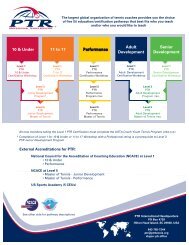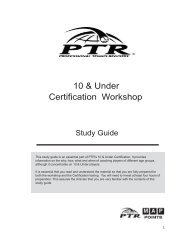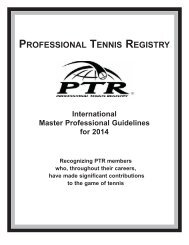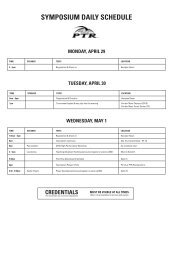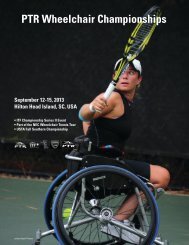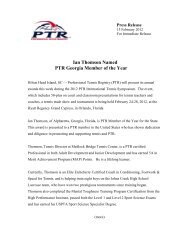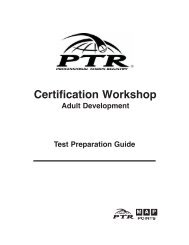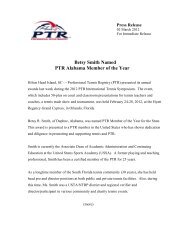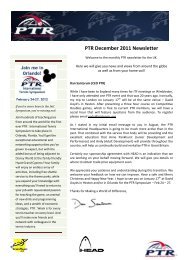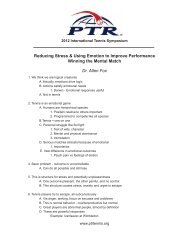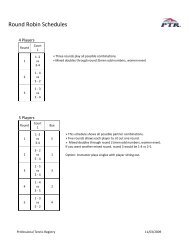SPORT SCIENCE - Professional Tennis Registry
SPORT SCIENCE - Professional Tennis Registry
SPORT SCIENCE - Professional Tennis Registry
Create successful ePaper yourself
Turn your PDF publications into a flip-book with our unique Google optimized e-Paper software.
Deliberate PracticeIn the early 1970s, H. Simon conceptualized the idea of ‘chunking’ (i.e., mentally grouping andassociating) information and the development of expertise as taking 10 years. 43 This concepteventually became the 10,000 Hour Rule, which states that it takes 10,000 hours of deliberatepractice to achieve expertise. In studying expertise in a multitude of activities, K.A. Ericssondeveloped the conceptual role of deliberate practice in the development of expertise. 44Because sports are governed by standardized rules and have quantifiable records, theyrepresent an excellent area for study. Essentially, there are three areas in which one canspend time on a sport like tennis: work, play and deliberate practice.The three are actually defined by the goals. For work, the goal is reward, such as earningmoney, ranking or making the team. Often, competition does not allow the tennis player tospend time on weaker technical and tactical aspects, since energy is focused on winning andusing strengths. For a touring pro, high school or college player, work might also be playing amatch. That sounds like play, but because there are rewards, such as money or getting ateam win and ranking, the motivational levels often differs from pure play. Work has benefits,since a tennis player can learn to compete better and feel something was achieved.Play (or playful interaction) has no goal system other than intrinsic value. Fun play isself-motivating and is inherently enjoyable, leading to the flow state, where a tennis playerbecomes immersed in the activity. Flow isn’t necessarily a competitive mental skill, but it canlead to ideal performance state, which is the optimal level of performance under stress. Thatimmersion is essential for commitment to the sport. It may help develop competitive mentalskills and better management of tactics and strategies. Often play, however, leavesrecognition and development of skills up to the student. Some students may not learn fromplay, and those students with better awareness and attention skills improve faster. However,play allows the athlete to become more inherently motivated without burnout.The third, deliberate practice, has the goals of improving performance. Deliberate practice ishighly structured, monitors progress, and includes tasks to overcome weaknesses. Unlikeplay, it is not inherently enjoyable, but instead requires focus and effort. Other thanimprovement, there are no rewards.PTR Practical On Court Applications for Sport Science 36



